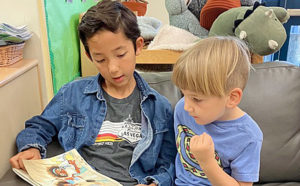
For more than 50 years, Synergy School has stayed deeply rooted to the tenets of progressive education. Our founding vision has been to empower our students and to provide them with the experiences and tools necessary to develop critical thinking, creativity, empathy, perseverance, and cultural and global awareness. These essential 21st century skills have been a part of our program from the beginning.
Education at Synergy is student-centered and developmentally appropriate. We are focused and responsive to the needs of our students’ emotional, social, academic, cognitive, and physical development. We nurture and support their natural curiosity and desire to learn by developing themes and projects based on student interests and differentiating curriculum. We encourage them to be active partners in their learning.
These values are woven into and embodied within our Agreement System, which is unique to Synergy. It fosters critical thinking, social responsibility, and respectful relationships.
Synergy School values the arts, sciences, and humanities equally and sees all subjects as important and integral to the development of children. Our curriculum is interdisciplinary and multi-sensory; themes and projects involve multiple strands
PROJECT BASED LEARNING
Students engage in meaningful hands-on projects that require sustained inquiry, communication, collaboration, and problem solving. They make choices about how to work and what to create to demonstrate understanding and knowledge.
ASSESSMENTS
Assessments are authentic, varied, and comprehensive to reflect each child’s learning experiences, including their social and emotional growth. These assessments include teacher observations and notes, discussions, portfolios, teacher-developed tests, and student self-reflections.
TECHNOLOGY
Technology is a means to support both teaching and learning. It is a tool to create content, solve problems, and enhance the educational experience. It allows students to access a range of resources and research and provides the digital literacy necessary for the 21st century.
We provide an environment for cooperative learning to give students a voice. They work together in small and large groups to achieve shared goals. They learn to make necessary compromises, to assume a shared responsibility for work, and to appreciate each individual’s contribution.
We work to create an environment that reflects the values of good citizenship – empathy, compassion, respect for differences, and responsibility for one another. We encourage social awareness by asking children to think beyond themselves, their families, and their friends, and to engage with the community beyond school. We guide our students in developing cultural awareness and global competency, as well as a commitment to social justice and the agency to act upon their beliefs.
We give students opportunities to make real world connections by moving beyond the classroom. Field trips provide access to wider resources, allowing students to apply their skills and knowledge. Overnight trips provide room for exploration, expansion, and expression of who our students are as people. Experiences in the outdoors build community and foster stewardship of the natural world and its resources. They also inspire self-confidence and resiliency beyond pen, paper, and keyboard.
